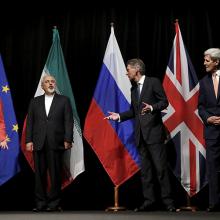Iran
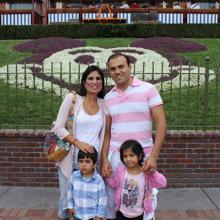
Saeed Abedini with his family. Image via American Center for Law and Justice/RNS
An Iranian-American pastor released by Iran last weekend is expected back in the U.S. after more than three years in prison there. Saeed Abedini, who since has been at a U.S. military hospital in Germany, is scheduled to arrive on American soil Jan. 21 evening, according to a Facebook post made Jan. 20 by his wife, Naghmeh Abedini. She described him in “very good condition.”
Saeed Abedini, a pastor jailed in Iran since 2012 for allegedly trying to set up house churches, was one of four Iranian-Americans freed on Saturday in a prisoner deal with the U.S. linked to the nuclear deal between Iran and six world powers.
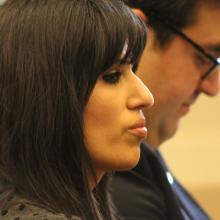
Nagmeh Abedini. Image via Adelle M. Banks / RNS
The wife of Saeed Abedini, the Iranian-American pastor imprisoned in Iran since September 2012, has had a difficult month.
First Naghmeh Abedini canceled all public appearances after telling supporters by email that her husband had abused her physically, emotionally, and sexually. Twelve days later, she released a statement saying she regretted her previous emails.
“I was under great psychological and emotional distress,” she said.

Image via ChameleonsEye / Shutterstock.com
The head of a national Republican Jewish activist group predicted on Nov. 10 that dissatisfaction with the Iran nuclear deal will increase the GOP's share of the Jewish vote in 2016. His Democratic counterpart argued that Jewish Americans, who overwhelmingly vote for his party, are divided over the deal and prioritize other issues.
The debate took place at one of the largest annual gatherings of Jewish activists in the world — the General Assembly of the Jewish Federations of North America — just hours before an address to the group by Israeli Prime Minister Benjamin Netanyahu.
“I say it with a broken heart and a lot of sadness,” said Republican Jewish Coalition Executive Director Matt Brooks on what he alleged is flagging Democratic support for Israel in recent years.
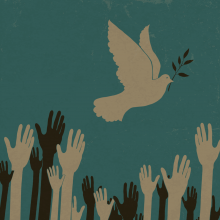
Image via pashabo/Shutterstock
Here are the politics of the Iran nuclear deal: Congress returns next week from its summer recess, and among the first orders of business will be taking up the Joint Comprehensive Plan of Action on Iran’s nuclear program, recently negotiated with Iran in Vienna by the five permanent members of the United Nations Security Council plus Germany.
Opponents of the agreement had hoped to use the August break to sway undecided members of Congress. It didn’t happen. Instead, yesterday, Sen. Barbara Mikulski of Maryland became the 34th senator to publicly support the accord— meaning there are enough votes to sustain a presidential veto of any bill intended to kill it.
Now, here is a faith perspective: For Christians, this is a victory for peace and diplomacy over another bloody and destructive war. It is a time when common sense wins over bombast — when reality wins over rhetoric.
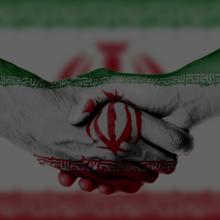
Image via MyImages - Micha/Shutterstock
President Obama has secured the votes required to pass the Iran nuclear deal, reports The New York Times.
Senator Barbara Mikulski became the 34th Democrat in favor of the deal one day after Senators Chris Coons of Delaware and Bob Casey of Pennsylvania pledged their support.
For the Jewish people, the pursuit of peace is a fundamental religious duty. Our tradition implores us to "seek peace, and pursue it" (Psalms 34:14); unlike other commandments that obligate us when they come our way, we must pursue peace at every opportunity.
The deal with Iran seeks to prevent Tehran from obtaining a nuclear bomb while also reaffirming the United States’ commitment to the pursuit of peaceful foreign policy solutions. We are not naive about the dangers of Iran’s nuclear program and regional ambitions; we embrace the agreement precisely because it is our best available option to ensure the security of the United States, Israel, and the entire world.
In light of this agreement, we are deeply concerned with the mistaken impression that the current leadership of the American Jewish community is united in opposition to the agreement. Despite what has been portrayed, these leaders do not represent the majority of Jewish Americans who support Congress’ approval of this deal. We, along with many other Jewish leaders, support this historic nuclear accord by the world’s most powerful nations and believe it is our best hope of preventing a nuclear-armed Iran.

Flags aligned for photo at the U.N. in Vienna on July 14. Photo by European External Action Service / Flickr.com
Later this week, President Obama will deliver a major speech promoting the Iran nuclear agreement at American University. I’m looking forward to the speech, both as an AU alum and someone closely following the upcoming Senate vote on the nuclear agreement. We know President Obama will make the strategic and scientific cases for the deal; I hope he makes the moral case as well.
President Obama has twice chosen the university in northwest D.C. to deliver major speeches, but it was also the site of President Kennedy’s landmark speech on peace and nuclear disarmament in 1963, where he declared, “While we proceed to safeguard our national interests, let us also safeguard human interests” and “the elimination of war and arms is clearly in the interest of both.”
If politicians are letting one person trump the tone of politics, just to go up in the polls or get on the debate stage, that’s very bad news for our nation’s civil discourse.
It certainly isn’t serious talk. Serious talk is “Hard work.” “Difficult negotiations.” “Competing interests.” “Coalitions and diplomacy.” Serious talk recognizes that no agreement, no matter how diligently negotiated, is perfect.
Iran is an enemy – an enemy of America, an enemy of Israel, and an enemy of peace. I believe that. But you need to find ways to make peace with your enemies in order to reduce potential conflict. Choosing war with our enemies as our first option since 9/11 has just made us more enemies.
The question is: what we should do about Iran?
We have a deal. And many of us in the faith community are relieved.
After months of negotiations, missing deadlines, and many stressful final days in Vienna, Iran has agreed to halt its nuclear weapons program for a decade or more, and allow credible international agencies to significantly monitor its behavior. In return, sanctions against Iran will be lifted once it demonstrates compliance on its end. Meanwhile, the West is hopeful that a younger Iranian generation might begin to liberalize the country, prompting a fuller entry into the modern world over the next 10 years. That hope remains to be seen.
Many of us in the faith community have called for diplomacy instead of the only plausible alternative: war with Iran.
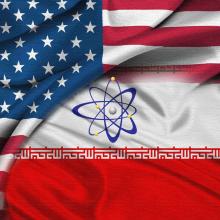
Image via Aref.ahm/Shutterstock
"If it is possible, as far as it depends on you, live at peace with everyone." (Rom 12:18 NIV)
Together with forty other organizations, Sojourners is calling on Congress to support the nuclear deal currently being negotiated with Iran. Sojourn have choice to either act to promote peace and restrain Iran from building nuclear weapons or to slide towards war.
"The following organizations, representing millions of Americans, urge you to support the strong nuclear deal being negotiated currently between world powers and Iran," the letter reads.
IN APRIL, eight nations, including Iran, announced an agreement for addressing Iran’s controversial nuclear activities. The Iran Nuclear Framework, supported by many Christian leaders in the U.S., is seen as an opportunity to “dramatically restrain the capacity of Iran to acquire nuclear weapons.” It could be one of the most significant nonproliferation achievements in history.
The proposed agreement significantly reduces Iran’s capacity to enrich uranium, closes the plutonium path to weapons capacity, and greatly increases international monitoring and verification of Iran’s nuclear infrastructure. It allows for lifting sanctions against Iran and opens the door to the possibility of improved bilateral relations.
The multiyear agreement sharply curtails Iran’s enrichment program. Iran has agreed to reduce by approximately two-thirds its installed centrifuges, from about 19,000 today to 6,104 under the deal. And Iran has agreed not to build any new facilities for the purpose of enriching uranium for 15 years.

(stockillustration / Shutterstock)
AS YOU READ this column, diplomats from the United States, the United Kingdom, France, Russia, China, Germany, and the European Union are working with their Iranian counterparts to finalize a deal concerning Iran’s nuclear program. I strongly believe that Christians should support the framework for this deal, announced in Lausanne, Switzerland, on April 2, as the best chance to prevent Iran from becoming a nuclear-armed state and—equally important—the best chance for the United States to avoid armed conflict with Iran.
In the days following the announcement of this framework, Sojourners authored and published a statement of support, which was signed by more than 50 Christian leaders (see statement here). Part of that statement reads as follows: “It is the sacred responsibility of all those entrusted with political power to pursue, with patient perseverance, every option that makes the destruction of war less possible, in order to protect human life and dignity. This becomes an even more urgent moral and spiritual imperative when we have the chance to prevent the further spread of nuclear weapons, with their terrifying potential of mass destruction ... a goal that reflects the binding commitments made by 191 U.N. member states, including the United States, under the Nuclear Non-Proliferation Treaty (NPT).”
A middle-aged Iranian man sat down next to me at Shirin Neshat’s new retrospective, "Facing History," in Washington, D.C. He looked at me, smiling and bewildered, and said, “All of this, this whole museum, just for her?”
He wasn’t the only one surprised. In Neshat’s opening comments to a packed house at a meet-the-artist presentation, she said, “It’s an honor as a woman and as a Middle Easterner to hold this much space.”
And she didn’t just take up space. She filled it — covered the entire second floor of the Hirshhorn Museum of Modern Art with Muslim women, Iranian history, Persian music, and creative commentary on the role of gender and politics on the life of a woman in exile.
1. Drone Strikes Reveal Uncomfortable Truth: U.S. Is Often Unsure About Who Will Die
Following the president’s admission this week that two Western hostages were killed in a drone strike in Pakistan, protestations against the veiled drone program have re-escalated. “Every independent investigation of the strikes has found far more civilian casualties than administration officials admit. Gradually, it has become clear that when operators in Nevada fire missiles into remote tribal territories on the other side of the world, they often do not know who they are killing, but are making an imperfect best guess.
2. Infertility and the Role of the Church
This week is Infertility Awareness Week. Writer Rachel Marie Stone dives into some of the attitudes about infertility and reproductive technologies in the church.
3. Meet Your New Attorney General
After postponing a vote for more than five months to fight along party lines over abortion language in a human trafficking bill, the Senate voted Thursday to approve the nomination of Loretta Lynch, 55, making her the first black woman to head up the Justice Department.
4. Those Countries at the Top of the World Happiness Report Also Have Great Press Freedom Rankings
See what country falls where and read more about the correlation.
This week, more than 50 Christian leaders came together to voice our support for the framework of a Joint Comprehensive Plan of Action between Iran and the P5+1 nations (the United States, the United Kingdom, France, Russia, China, and Germany), concerning Iran’s nuclear program. Sojourners published the leaders’ statement as a full-page ad in Roll Call, a Washington, D.C., political newspaper widely read by members of Congress and their staff.
The statement, signed by leaders from all the major streams of American Christianity — Roman Catholic, evangelical, mainline Protestant, Orthodox, and Pentecostal — is reprinted below. We want to share this letter with you, the Sojourners community, and the broader public. I urge you to prayerfully consider adding your own voice in support of the diplomatic process and share the opportunity with others. Read it, discuss it in your churches, and add your name. This is a historic opportunity for diplomacy to triumph over armed conflict, and as people of faith, you can play an important role in helping the process succeed.
—Jim Wallis, Founder and President, Sojourners
As Israelis mark Holocaust Memorial Day on April 15, a study by researchers at Bar-Ilan University has found that the adult children of Holocaust survivors are more fearful than their mainstream peers about the threat of Iran developing a nuclear weapon.
Given that many studies over the decades have found that children of Holocaust survivors are deeply affected by their parents’ traumatic experiences, Amit Shrira, the study’s author, set out to discover whether these second-generation survivors were more anxious over a potential Iranian bomb than others of their generation. His study was published in Psychological Trauma, a journal of the American Psychological Association.
Shrira compared the feelings of 63 children of Holocaust survivors whose parents lived under a Nazi or pro-Nazi regime to those of 43 children whose parents either fled to unoccupied countries or immigrated to Israel.
The study found that second-generation survivors “exhibit greater preoccupation with the Iranian nuclear threat” than the comparison group.
The U.S. Catholic bishops have welcomed the Obama administration’s tentative agreement aimed at limiting Iran’s nuclear ambitions, and their top spokesman on international affairs bluntly warned Congress against doing anything to undermine it.
The bishops “oppose efforts that seek to undermine the negotiation process or make a responsible multi-party agreement more difficult to achieve and implement,” Bishop Oscar Cantu, chairman of the bishops’ Committee on International Justice and Peace Committee, wrote to House and Senate lawmakers on April 13.
“The alternative to an agreement leads toward armed conflict, an outcome of profound concern to the Church,” said Cantu, who heads the Diocese of Las Cruces, N.M.
The warning — and accompanying support in a letter of commendation that Cantu sent last week to Secretary of State John Kerry — follow a thumbs-up from Pope Francis to the proposed accord, and coincides with an endorsement on April 13 by a group of largely liberal mainline Protestant leaders.
Diplomats from the U.S. and six world powers meeting in Switzerland earlier this month unveiled the framework of what could be an historic accord to inspect Iran’s growing nuclear program and prevent it from developing a nuclear weapon.
1. ‘A Rape on Campus:’ What Went Wrong?
Columbia University’s Journalism school released its report detailing the journalistic failures of Rolling Stone’s viral story ‘A Rape on Campus,’ which initiated, and later may have stifled, an honest conversation about the prevalence rape on college campuses. Read the full report. “[Writer Sabrina Rubin] Erdely and her editors had hoped their investigation would sound an alarm about campus sexual assault and would challenge Virginia and other universities to do better. Instead, the magazine's failure may have spread the idea that many women invent rape allegations.”
2. The Courage of Bystanders Who Press ‘Record’
“Despite the fact that the world can now see Eric Garner being killed by an illegal chokehold — despite the fact that New York City Police Department banned chokeholds years ago — film of the incident did not result in the officer, Daniel Pantaleo, being charged. But thanks to the efforts of Ramsey Orta, who filmed Garner’s death, we know.”
3. Hope but Verify: The Iran Nuclear Framework
“House Speaker John Boehner recently said this about the broader instability in the Middle East: 'The world is starving for American leadership. But America has an anti-war president.' In the context of our faith — or even in the context of conservative ideals — is leadership that prevents war something to be maligned?”
4. How the Presidential Candidates Found Their Faith
“This season’s crop of presidential candidates reflects this country’s many contradictions in faith.” Newsweek explores the faith backgrounds of the apparent 2016 field so far.


